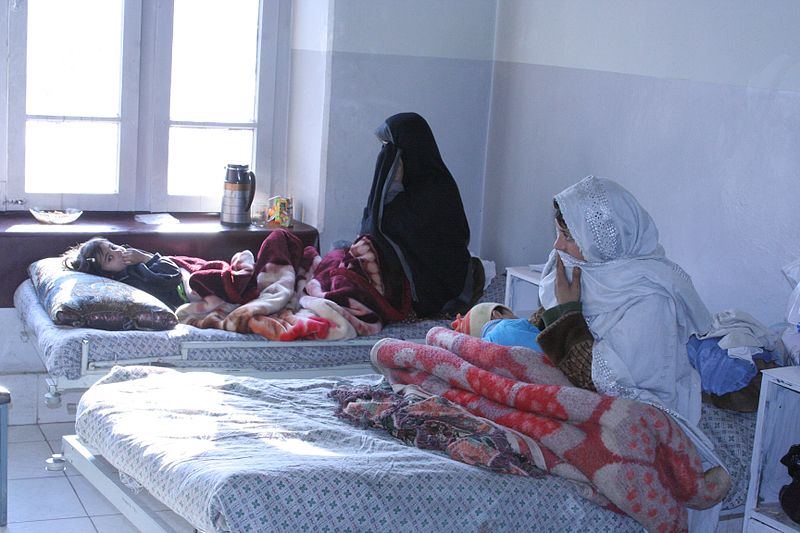The COVID-19 pandemic has also reached Afghanistan, as the country deals with infections amidst an ongoing crisis since the Taliban took over. Aside from a humanitarian and economic crisis, Afghanistan appears to also suffer a healthcare crisis as it deals with coronavirus cases.
According to Al Jazeera, the COVID-19 situation in Afghanistan has improved so far. However, while the cases have improved, the Afghan-Japan Communicable Disease hospital in Kabul is on the verge of a “collapse.” The report revealed that the fuel needed to produce oxygen is running low in the only facility for COVID-19 in the capital along with an increasing shortage in supplies such as essential drugs. The hospital’s staff are also struggling financially but still show up to treat patients.
The hospital’s administration logistics manager Dr. Ahmad Fatah Habibyar told the outlet that they are dealing with three months of unpaid salaries, shortage of equipment, drugs, and food. Dr. Habibyar noted that some of the staff in the hospital have struggled to the extent that they had to sell their household furniture in order to make ends meet.
“Oxygen is a big issue because we can’t run the generators,” said Dr. Habibyar, adding that the hospital’s production plant has not worked for months as they could not afford the diesel fuel required. They have had to resort to buying oxygen cylinders from a local supplier, and the doctors are also anticipating what they fear to be an inevitable set of new infections from the Omicron variant.
Meanwhile, the US House of Representatives is calling on the Biden administration to take action in preventing an economic crisis in Afghanistan. A group of lawmakers led by Democratic Reps. Jason Crow and Tom Malinowski and Republican Rep. Peter Meijer proposed steps to provide economic relief in a letter addressed to Secretary of State Antony Blinken and Treasury Secretary Janet Yellen this week.
“We have no desire to help the Taliban government and believe that there is an approach the US can take to help prevent a catastrophic collapse of Afghanistan’s aid-dependent economy while not providing legitimacy to the Taliban,” the lawmakers wrote.
They advised the Biden administration to release the frozen Afghan funds to a United Nations-backed agency to pay teacher salaries and provide meals for children in schools as long as girls can attend, clarifying sanctions exemptions for humanitarian aid, assisting “multilateral organizations attempting to pay Afghan civil servants,” and allowing Afghanistan’s financial institutions to inject funds into the Afghan economy among other measures.



 Trump Administration Appeals Court Order to Release Hudson Tunnel Project Funding
Trump Administration Appeals Court Order to Release Hudson Tunnel Project Funding  Trump Slams Super Bowl Halftime Show Featuring Bad Bunny
Trump Slams Super Bowl Halftime Show Featuring Bad Bunny  Trump Lifts 25% Tariff on Indian Goods in Strategic U.S.–India Trade and Energy Deal
Trump Lifts 25% Tariff on Indian Goods in Strategic U.S.–India Trade and Energy Deal  Anutin’s Bhumjaithai Party Wins Thai Election, Signals Shift Toward Political Stability
Anutin’s Bhumjaithai Party Wins Thai Election, Signals Shift Toward Political Stability  Sydney Braces for Pro-Palestine Protests During Israeli President Isaac Herzog’s Visit
Sydney Braces for Pro-Palestine Protests During Israeli President Isaac Herzog’s Visit  Nicaragua Ends Visa-Free Entry for Cubans, Disrupting Key Migration Route to the U.S.
Nicaragua Ends Visa-Free Entry for Cubans, Disrupting Key Migration Route to the U.S.  Trump Allows Commercial Fishing in Protected New England Waters
Trump Allows Commercial Fishing in Protected New England Waters  Antonio José Seguro Poised for Landslide Win in Portugal Presidential Runoff
Antonio José Seguro Poised for Landslide Win in Portugal Presidential Runoff  Trump Signs Executive Order Threatening 25% Tariffs on Countries Trading With Iran
Trump Signs Executive Order Threatening 25% Tariffs on Countries Trading With Iran  China Warns US Arms Sales to Taiwan Could Disrupt Trump’s Planned Visit
China Warns US Arms Sales to Taiwan Could Disrupt Trump’s Planned Visit  Trump Congratulates Japan’s First Female Prime Minister Sanae Takaichi After Historic Election Victory
Trump Congratulates Japan’s First Female Prime Minister Sanae Takaichi After Historic Election Victory  Trump’s Inflation Claims Clash With Voters’ Cost-of-Living Reality
Trump’s Inflation Claims Clash With Voters’ Cost-of-Living Reality  U.S. Lawmakers to Review Unredacted Jeffrey Epstein DOJ Files Starting Monday
U.S. Lawmakers to Review Unredacted Jeffrey Epstein DOJ Files Starting Monday  Bangladesh Election 2026: A Turning Point After Years of Political Suppression
Bangladesh Election 2026: A Turning Point After Years of Political Suppression  Pentagon Ends Military Education Programs With Harvard University
Pentagon Ends Military Education Programs With Harvard University  Japan Election 2026: Sanae Takaichi Poised for Landslide Win Despite Record Snowfall
Japan Election 2026: Sanae Takaichi Poised for Landslide Win Despite Record Snowfall  Bosnian Serb Presidential Rerun Confirms Victory for Dodik Ally Amid Allegations of Irregularities
Bosnian Serb Presidential Rerun Confirms Victory for Dodik Ally Amid Allegations of Irregularities 































